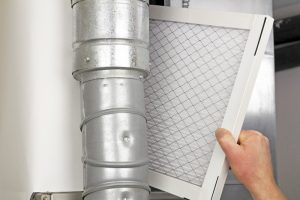 You may have read in one of our other blog posts that we recommend changing your air filter every 1-3 months. We aren’t just saying this because it’s a nice thing to do—it will actually help you get the most effective and efficient use out of your heating and cooling systems as possible. And consider how much we use either one of these HVAC systems, chances are that you’d like to do anything you can to save money when you use them, and prevent repairs.
You may have read in one of our other blog posts that we recommend changing your air filter every 1-3 months. We aren’t just saying this because it’s a nice thing to do—it will actually help you get the most effective and efficient use out of your heating and cooling systems as possible. And consider how much we use either one of these HVAC systems, chances are that you’d like to do anything you can to save money when you use them, and prevent repairs.
One way to do this is by performing one small maintenance task—among the only tasks we actually suggest homeowners do on their own—change that air filter! It’s easy to underestimate how powerful and important this HVAC component is, but we assure it that it has a lot of power. It protects the HVAC system itself, although there’s a common misconception that it’s there to protect your indoor air quality. Read on to learn more!
Your Air Filter’s Purpose
As we alluded to above, the main purpose of your HVAC system’s air filter is not to protect your air quality, but rather to protect the system itself. Today’s air filters are designed to optimize air quality as much as they can, but since your furnace and central air conditioner both have a blower fan that sucks in air at a high speed, it’s possible for heavy amounts of dust and debris to get sucked in, too.
Dirt and other particles circulating through the air in your home could potentially damage the HVAC system, pummeling it with that debris. The filter is in place to protect your furnace from these particles, and a dirty or clogged up HVAC system can start to struggle.
What Happens When Your Air Filter Is Too Clogged
Both your furnace and AC system are designed to take in a set amount of air with each cycle they go through. This airflow helps keep you comfortable in your home. Also, these cycles ensure that the HVAC system’s motor doesn’t run for too long. Dirt and debris clogging up the filter won’t allow the right amount of air through, which impacts your comfort and that blower motor.
As a result, you’ll find yourself paying more to even use your HVAC system. It will have to run nonstop in order to compensate for the low airflow, resulting in higher monthly bills than you should have to pay. A dirty air filter can also lead to serious repair needs, to resolve problems like:
- Short-Cycling
- Overheating
- Emergency Furnace Repairs
- Freezing Coils
How to Change Your Air Filter
You shouldn’t have to pay to resolve any of the above-mentioned problems, especially since they are so easily resolvable—simply change your air filter. Air filters are generally affordable, and you should be able to stock up on enough for a year at your local hardware store.
When it comes time to replace yours, you can locate the old one at a marked point near your air handler. There will be arrows that direct you on what direction to put the new filter in. If you have any questions, of course, please don’t hesitate to contact our team.
